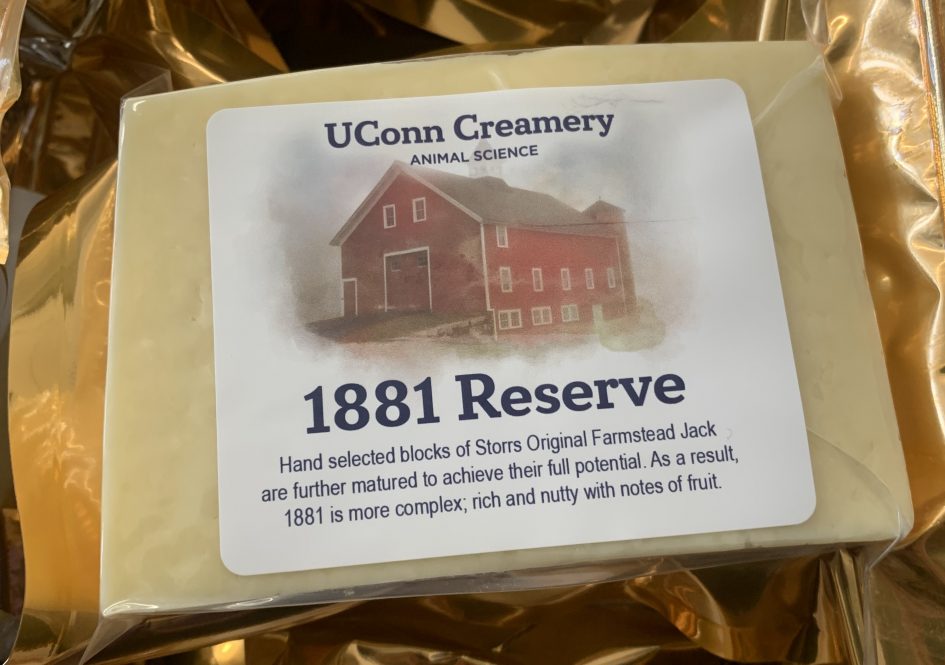There’s more than just ice cream at the UConn Dairy Bar. In addition to delicious dessert favorites, the UConn Creamery has crafted new cheeses available for purchase through the UConn Dairy Bar. But to make it happen on a large scale during the COVID-19 pandemic required ingenuity and science.
The Creamery’s capacity to develop new products and reinvigorate its cheesemaking enterprise is an emerging silver lining to the COVID-19 pandemic. When the Dairy Bar closed in March 2020 along with many University facilities and services, the Creamery staff, who are constantly busy producing hundreds of gallons of UConn’s many popular ice cream flavors year-round, found themselves not facing the pressure of keeping up with customer demand.
While the Dairy Bar reopened in late June 2020 for curbside pickup service with reduced hours, during the interim closure and facing a sharp decline in sales for one of Connecticut’s popular summer stops, the Creamery staff discussed options as freezers were stocked full of ice cream.
Dennis D’Amico, an associate professor in the College of Agriculture, Health and Natural Resources (CAHNR), is the creator of the Creamery’s cheeses, which are made with fresh milk from the University’s renowned dairy herd.
“I didn’t want anyone to think we were going to be sitting on our hands during this time,” says D’Amico. “The Creamery does not have a work from home option. We are a production facility. One option was to revisit policies and clean and fix equipment, which we did.”
D’Amico and Creamery manager Bill Sciturro decided developing and expanding the unit’s cheese production was the direction to go. But it’s not as easy as you might think to transition from producing ice cream to artisanal cheeses.
To make the switch, D’Amico used his knowledge as a food microbiologist and an expert on dairy technology.
“As it stands now, the Creamery is arranged to manufacture ice cream. We needed to figure out how to make a world-class cheese with none of the usual tools and controls available to full scale cheesemakers. We don’t have an aging cave or aging refrigerators. We have freezers and cold storage at set temperatures. This is where science comes in.”
Before he joined the Department of Animal Science in 2013, D’Amico had already spent several years working with dairy farmers who turned to artisanal cheesemaking to diversify their dairy farm product offerings.
These experiences made D’Amico uniquely aware of the constraints of small-scale cheese production. These obstacles forced him to be innovative and creative with his latest cheese creations, using his scientific knowledge to overcome certain hurdles.
The Creamery has sold its cheeses through the Dairy Bar before, but one of D’Amico’s goals was to ensure their manufacturing and aging process was refined and that enough cheese in every flavor was made to offer for sale for the foreseeable future. It was also an ideal time to reimagine the branding. As part of the effort, the CAHNR team worked with university designers to develop new logos and labelling.
The Flavors of Horsebarn Hill
There’s a mix of old and new cheeses going forward. The award-winning queso blanco returns as Old Farm Lane Fresh Cheese in several flavors. It is a traditional farmer’s cheese in a queso blanco style, which softens when heated but does not melt. Over the past six years, the Creamery’s queso blanco cheeses have been consistently recognized by the American Cheese Society Judging Competition. They have also been recognized for many years at the Big E Cheese Competition and its original flavor received a gold medal at the event in 2015.
Also returning is the Juustoleipa. This Finnish-style “bread cheese” is made from fermented milk and then baked to form a crisp caramelized crust.
“It’s almost like eating just the top of a pizza,” explains D’Amico.
The Creamery is most excited to introduce two new aged cheeses that were specially designed by D’Amico for the Creamery. Storrs Original Farmstead Jack, a creamy cheese with a buttery taste based on the classic American Jack cheese.
“Jack cheese is a flexible style and we use a unique blend of cultures to produce more complex flavors than what you’ll find in versions on store shelves,” says D’Amico.
The term ‘Farmstead’ also has a treasured cultural connection for UConn.
“It means the cheese is all made on site with milk from our own herd,” says D’Amico. “Our department cares for the animals and handles the milk to produce all of our dairy products and this is a way of honoring that.”
The special blend of cultures used to produce Storrs Original also contributes to the evolution of 1881 Reserve. For this cheese, hand-selected blocks of Storrs Original are further aged under special conditions to create a richer taste with a complex nutty flavor.
New Dairy Bar Traditions
So while the pandemic is keeping visitors from eating in or around the Dairy Bar like they used to, customers can still taste the flavors of UConn. D’Amico hopes UConn’s cheese production will become a memorable part of the Dairy Bar experience.
“When we used to make small batches of cheese, it was hidden in the back because of our old set up,” says D’Amico. “We’ve had time to refit, re-pipe, and rewire everything to be mobile. Now we can put our cheese production out in the open. We’re doing all we can to make UConn’s cheese as famous and loved as our ice cream.”
Visit the Dairy Bar website to learn more about UConn Creamery’s artisanal cheeses.



